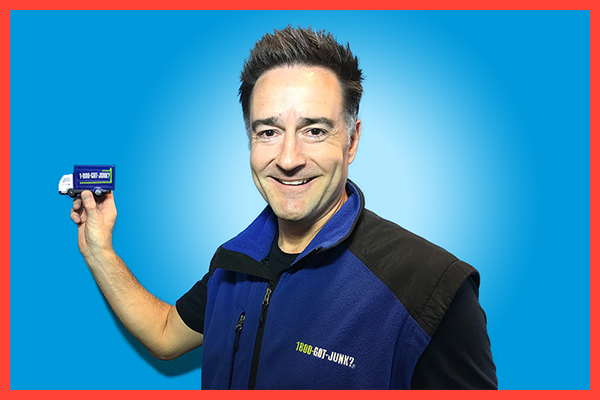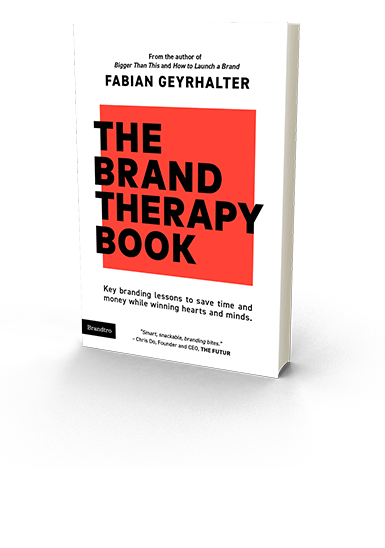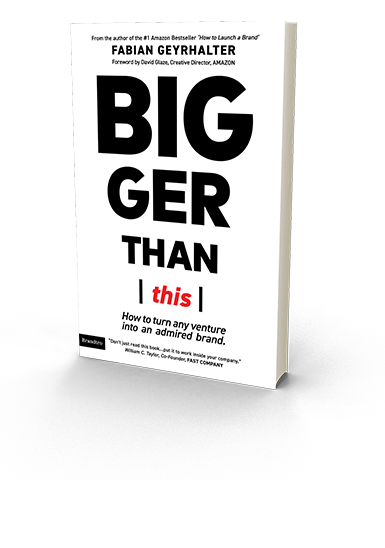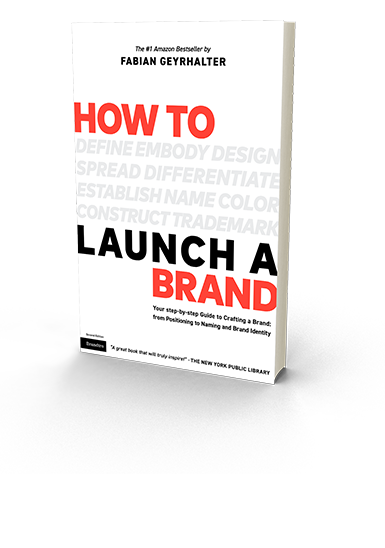Tag Archives: Grit Daily
How Brian Scudamore, Whose Brands Are Making A Million Dollars A Day, Leads With Brand Thinking

An edited version of this interview was first published in my column on Grit Daily on 02/19/19.
I devoted my professional career to branding, from authoring books on the subject, to holding workshops and deriving brands through my consultancy, I live and breathe branding. Yet, when I sat down with serial entrepreneur Brian Scudamore, who I met when we were both mentoring at Guy Raz’s How I Built This Summit, I changed seats and had Brian share brand advice instead of myself.
Brian just released the book WTF (Willing to Fail): How Failure Can Be Your Key to Success and is making a splash in the business world. And that is mainly because he knows a thing or two about how to build a brand as he has started a business in college which today brings in an average of a million dollars a day (yes, you read that correctly!) and he is on the path to becoming a billion dollar company.
Brian Scudamore is a serial entrepreneur and author who has always taken the road less traveled. At just 19 years old, he pioneered the industry of professional junk removal with 1-800 GOT-JUNK, turning a chore people avoid into an exceptional customer service experience, changing the narrative of an entire industry in the process. When he ran out of new markets to expand to he scaled the business into three more home service brands under the O2E brands umbrella: WOW One Day Painting, You Move Me, and Shack Shine.
In between appearances on Oprah and Dr. Phil, and on the morning where he made it onto the home page of CNN.com, little me was fortunate to score time on his schedule to talk about branding, culture, and naturally about failures in the journey of an entrepreneur.
How do you get into that mindset of embracing failures? It’s so easy to say ‘fail forward,’ but most entrepreneurs are extremely driven, many have a ginormous ego and they often take failures very personally. How do you run towards failure with open arms?
So I’ve learned to ask myself one question in this journey. When I am failing, when I am having a difficult moment, when I am feeling depressed, whatever is going on that seems and feels like a failure, I ask myself one powerful question: What’s one potentially awesome thing that can come from this tough situation? And I start to brainstorm and sometimes I create a big list, and I go wow, thank goodness, this is exciting! How awesome that I am failing, because look at all these amazing things that can happen as a result of this learning. I think it’s a perception. I think that people need to really, really look at why is this failure happening and trusting that you’re in the right place at the right time and that while the mistake might hurt, it is going to get you to a better place if you so choose.
What was a ginormous brand fail that you went through with your venture?
I think one of the biggest ones was my first big flop. I had eleven employees, and they say one bad apple spoils the whole bunch. So I end up getting rid of my entire company. I have nine bad apples, and I sat down with them, and I said guys, I gotta let you know that I think I found the wrong people. I haven’t treated you right. I haven’t given you the love and support you need to be successful, and I’m making a tough decision here, but we’re gonna part ways. So I went from a company of twelve, myself and eleven, down to one. It was just me hauling junk. It was just me answering phones and trying to rehire. But I learned a valuable lesson from that failure that your very first employee has to be amazing because that person is going to spread the culture, the vibe, and the feeling of the business and that you need to really build on finding the right people and treating them right, and it’s made a huge difference. I look at our company of over five hundred people today and how amazing for us to feel so proud about the type of culture we have. It would have never have happened if I hadn’t made some of the mistakes I did.
Let’s talk about company culture a bit because I’m a firm believer that if done right, any startup should invest time and energy into creating a strong culture that can basically serve as the platform upon which everything else can be built. How important are core values to you?
Jim Collins wrote a book called Good to Great, one of my favorite books, and he said you’ve got to have values. It doesn’t matter what they are as long as they’re your values. So we went and took a little retreat to Bone Island, a little island near our office, and I said to my team at the time, maybe fifteen years ago, I said what are our values? What words can describe who we are, not who we want to be or who we are trying to be, but who we are today? What are those words? We took Post-It notes, we put them all up on these big windows, and we grouped all four hundred Post-Its with different words into four distinct categories: Passion, Integrity, Professionalism, and Empathy. And when we looked at those words they made the acronym of PIPE. It turned into this interesting tool around ‘the junkyard,’ our head office, where we would say to people: “I don’t know if that decision was very PIPE?,” or “I don’t know if that behavior was very PIPE. It’s not in line with our values.” And so values can’t just be a poster on a wall. Values have to be something that you hold your team, your people, accountable to and you hold yourself accountable to. If you’re not displaying passion, if you’re not displaying integrity, how can you take a look at yourself in the mirror and say what do I need to change? Let me be vulnerable and admit my mistake and then let me make sure that we are living, all of us, each and every day, by our values.
With building a franchise there is very tight brand management and brand stewardship involved, but equally as important is consistent brand design. What are some of the key steps that you had to go through to create a platform of tight brand rules and guidelines that also empower franchise owners a little bit, rather than solely restrict them?
I sat down and I read a book called The E-Myth by Michael Gerber. Michael and I have become friends. He is eighty-two years old. He wrote my favorite book on the planet and what the book talks about is people don’t fail, systems do. Take everything in your business, and it doesn’t matter if you’re running a brand agency, or a junk removal company, take everything you do and write down on one page what’s that one best practice and how would you teach someone else to do it? So how do you load a truck, how do you answer the phone in the call center and what’s the introduction? What’s that high energy and how do you talk to the customer? How do you market the business? How do you do your accounting? Every single piece of the puzzle has to be down on one page simplified. Here are the best practices and steps. You start with the right recruiting systems to find the right people, the right training systems to make sure that they’re trained properly, and you’ve got good people doing the right stuff and then the operating systems to keep them great. If you think back to when I fired that entire team, a team with eleven people, the biggest missing system was not those people. They didn’t fail, it was me failing because I didn’t have the right recruiting systems and then I didn’t have the right training systems and so it all kind of compounded in a massive failure, but it taught me and inspired me to end up finding that book not long after to really set up the processes in my business. If you’re trying to build a franchise, franchise brands all they are is proven recipe. A recipe that you can replicate that others can follow with the same success that you’ve had.
Especially with the junk business, you have to give instructions on how to change the narrative and change customer behavior to embrace the company of a franchisee as a brand rather than just another junk hauling man. How did you go about that? A lot of it was great uniforms and exceptional service, but how did you start as a brand, start talking about junk in a way where people felt like oh, 1-800-GOT-JUNK is an actual brand and not just local people who are driving around picking up my junk?
I think it was just years and years of consistency of the blue and green 1-800- GOT-JUNK brand and logo. Our trucks parked as massive billboards across every city that we operate in. It was the PR. All these things that continued to happen, it was building that press engine. It was building that consistency of the brand and that people wanted to be a part of the winning story. Our success has helped, but these overnight success stories as they say, sure take a long time. This wasn’t something that just happened in a year or two years, next month will be our thirtieth anniversary as a company.
You are a brand genius. You have done more than most people will ever do with one brand. What does branding mean to you?
Branding to me is a look and feel, a connection. Think of a person. You look at Oprah Winfrey, the way she dresses, the personality, the energy she’s got, her intelligence, the way she can connect with human beings on humanity. She is a great brand. Businesses have to do the same thing. How do you look? How do you act? Your values, what’s the brand feel like and what makes you so special and how do you differentiate yourself from anyone else in the world? Look at brands, here in front of me I’ve got my iPhone. Some people have an Android device. Both are great, both are brands. They’re very, very different and they appeal to different people for different reasons. I think that’s the key. it is just understanding that a brand is a feeling, a look and feel and how do you strategically create it in the right way?
What in your eyes is the most important part about branding that any startup should invest in getting right in the beginning? What is this one thing with your brand you have to get right in the beginning?
I think the one thing is just deciding what the brand will look and feel like and stick to it. Just really be consistent. Is McDonald’s the greatest looking logo in the world? Eh, the colors don’t appeal to me, but you know what they’ve done exceptionally well? They’ve been consistent over time, they have not strayed from their brand look and feel. So, I think it’s more important just to pick something and go, you know what, we are going to be proud, we’re going to be all in and stick with it.



